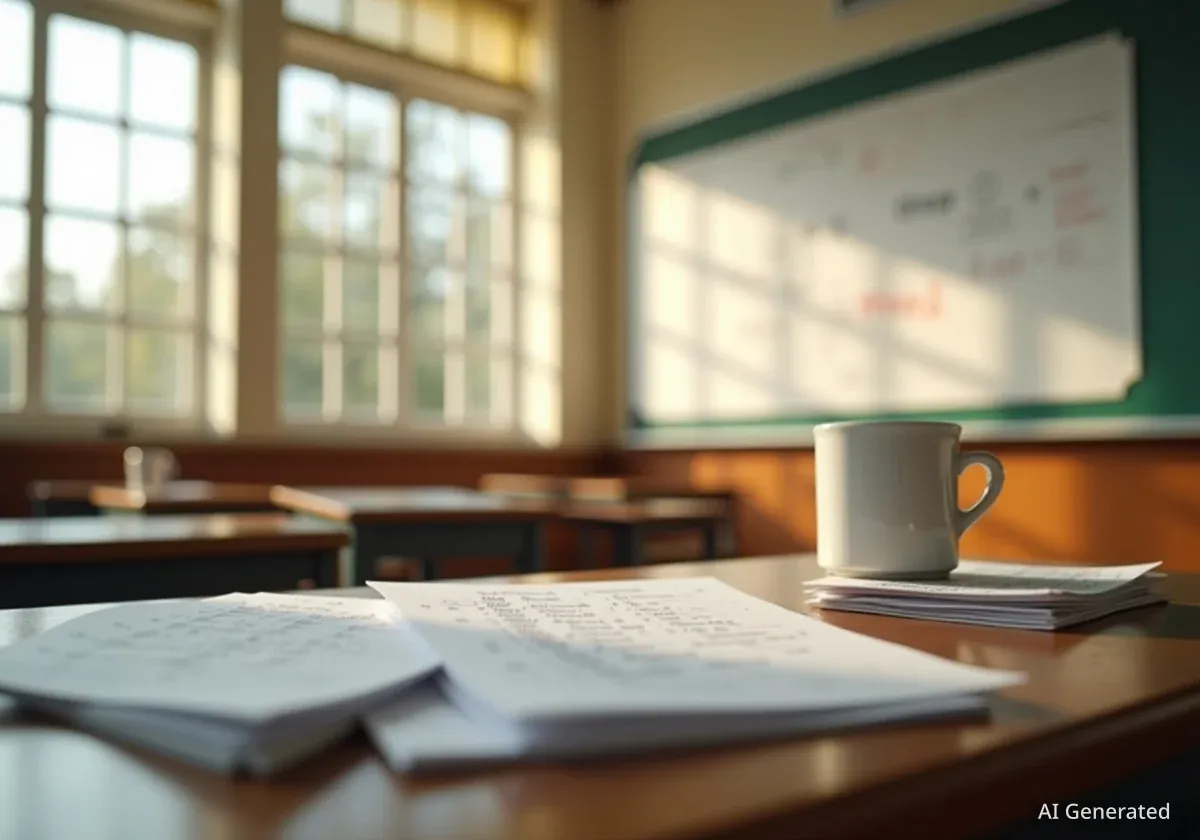An educator's detailed online account of her professional disillusionment is resonating with teachers nationwide, highlighting a growing sentiment that the modern school system's intense focus on standardized testing and performance metrics is harming both students and teachers. The post describes a shift from a passion for teaching to a feeling of exhaustion, driven by administrative pressures that prioritize data over genuine learning.
Key Takeaways
- A teacher shared her experience of burnout on social media, blaming systemic issues rather than student behavior.
- The primary concerns cited are an overemphasis on test scores, attendance data, and other superficial metrics.
- The educator reports that creative and engaging subjects like science and social studies are being reduced to make more time for tested subjects.
- National survey data confirms widespread teacher skepticism, with only 25% of educators finding state-mandated tests useful for instruction.
- The teacher argues this approach leads to boredom and disengagement for both students and educators, while significant learning gaps go unaddressed.
An Educator's Perspective on Professional Burnout
In a widely circulated post on the social media platform Reddit, a teacher who once felt a deep passion for her profession detailed why her enthusiasm has faded. She attributed this decline not to the challenges of managing a classroom, but to what she describes as a misaligned educational system.
"Teaching used to be my passion and every year, every day, I can just feel it draining every ounce of my energy," she wrote. "It’s not even the kids... The school system has turned so far in the wrong direction that the children are suffering."
Her account provides a window into the daily frustrations faced by many educators. She explained that the constant pressure to improve test scores, maintain attendance records, and satisfy administrative demands has stripped the joy from her work. This sentiment reflects a broader conversation happening in education circles about the sustainability of the teaching profession amid increasing demands and stagnant support.
The Broader Context of Teacher Dissatisfaction
Teacher burnout has become a critical issue in the United States, exacerbated by the COVID-19 pandemic. According to the National Education Association, a significant number of educators are considering leaving the profession earlier than planned. Key factors include low pay, lack of administrative support, and high-stakes testing environments, which many feel limit their ability to teach effectively.
The Pressure of Performance Metrics and Testing
A central theme of the teacher's post is the overwhelming focus on measurable outcomes. She described a school environment where administrators advocate for teacher self-care while simultaneously increasing their workload with new testing requirements and curriculum mandates.
This experience is supported by broader research. A survey from the Education Week Research Center provides statistical backing for these anecdotal claims. The findings reveal a significant disconnect between administrative requirements and classroom realities.
Educator Views on Standardized Testing
- Only 25% of educators believe state-mandated tests provide useful information for teachers.
- Nearly half of educators (49%) reported feeling more pressure to ensure students perform well on state tests now than before the pandemic.
- Another 42% said the pressure has remained about the same, indicating a sustained high-stress environment for the vast majority of teachers.
The teacher argued that this data-driven approach forces educators to "teach to the test" rather than fostering critical thinking and genuine understanding. Students who learn differently or require more hands-on instruction are often left behind in a system that values standardized performance above all else.
Curriculum Narrowing and Student Disengagement
One of the most significant consequences of this testing-centric model, according to the educator, is the erosion of a well-rounded curriculum. She lamented the decline of subjects that spark curiosity and creativity in students.
The Disappearance of 'Fun' Subjects
"These poor children can’t be kids anymore," she stated. "I can’t remember the last time I did a fun craft. They sit for hours doing math and reading."
She specifically noted that science and social studies—subjects that often captivate young learners—are being systematically reduced. The reason, she explained, is simple: they are not typically assessed on state-mandated standardized tests. This narrowing of the curriculum is a common complaint among educators who believe it deprives students of essential knowledge and skills.
"The two subjects kids are interested in most and actually passionate about are going extinct because, go figure, state testing doesn’t assess those subjects!"
This focus on a limited set of subjects leads to a monotonous classroom environment. "They’re bored. I’m bored," the teacher admitted, summarizing the impact on both student and teacher morale. The lack of variety and creative expression contributes to a cycle of disengagement that can be difficult to break.
Ignoring Deeper Educational Challenges
The teacher also highlighted what she called "the elephant in the room": the significant number of students performing several years below their designated grade level. She expressed frustration that administrative meetings often consist of "unrealistic conversations" about teaching methods while ignoring this fundamental problem.
This issue is particularly pressing in the post-pandemic era, where learning gaps have widened for many students. By prioritizing test scores, she argued, the system fails to provide the resources and strategies needed to help struggling learners catch up. Instead, teachers are expected to push forward with a standardized curriculum that doesn't meet the needs of many children in their classrooms.
Ultimately, the teacher's post serves as a powerful testament to the human cost of an education system increasingly driven by data. It suggests that for learning to be meaningful and for teaching to be a sustainable career, the focus must shift back to nurturing student curiosity, creativity, and individual growth, rather than simply preparing them to fill in bubbles on a test sheet.





